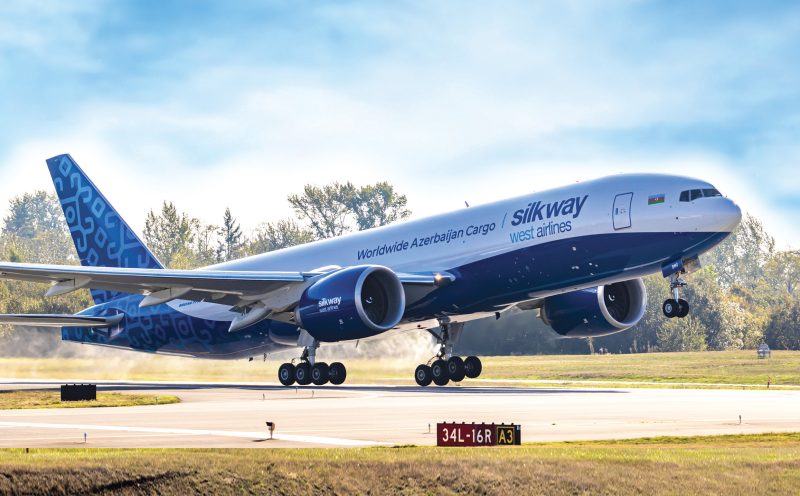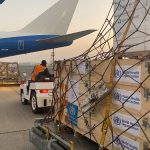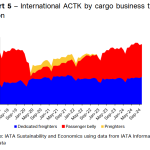Silk Way West Airlines: Leading the Way to Profitable Growth and Pragmatic Sustainability
With the demand for cargo services continuing to rise, Silk Way West Airlines has positioned itself as a key player in the global logistics sector. The airline has placed orders for eight new Boeing freighters, including the world’s largest and longest-range twin-engine freighter, the Boeing-8, marking its commitment to operational efficiency and sustainability. This strategic move ensures that the airline stays at the forefront of environmentally sustainable operations while responding to market demands with greater capacity and improved efficiency.
In an exclusive interview with Air Cargo Update at the Air Cargo China 2024 event, Wolfgang Meier, President and CEO of Silk Way West Airlines, shared insights into how the cargo carrier from the Caspian region has distinguished itself from its competitors. Mr. Meier discussed the airline’s strategic expansion plans, its focus on sustainability, and its vision to be the leading “Ambition Movers” from Azerbaijan.
Defining an “Ambition Movers”
When asked about the meaning of “Ambition Movers,” Mr. Meier explained that the tagline reflects the airline’s internal and external drive to capitalize on growth opportunities. The concept of “Ambition Movers” resonates with the idea of progress and leadership, highlighting Silk Way West Airlines as a company that drives ambition, not just for itself, but for its customers and stakeholders. This also reflects the company’s strategic role in bridging Eastern and Western markets through its Baku hub, ensuring that the airline plays a pivotal role in shaping the future of global logistics. It suggests that the airline plays an active role in moving the ambitions of businesses across the globe, which aligns perfectly with its mission of connecting the East and West. The philosophy behind this concept is to inspire employees and partners alike, creating a culture that thrives on innovation and a forward-thinking approach. Over the last 12 years, Silk Way West Airlines has leveraged this mindset to achieve impressive growth, currently operating hundreds of flights monthly across Europe, Asia, and the Americas and handling over half a million tons of cargo annually.
One of the most notable recognitions of this success came in 2020, when Silk Way West Airlines was awarded the prestigious title of “Cargo Airline of the Year” by Incheon Airport. This award recognized the airline for achieving up to 25,000 tons of international cargo turnover and excelling in operational performance on its routes to South Korea.
Phase-Out of Older Aircraft Models
Growth must be sustainable and profitable, according to Mr. Meier. To align these goals, Silk Way West Airlines has embarked on an ambitious fleet renewal program, phasing out older aircraft and replacing them with more fuel-efficient models. “We began re-fleeting last year, and this process will continue over the next six to seven years,” Mr. Meier shared.
The airline has already ordered six Boeing 777 freighters, two of which are currently in service, with four more expected to join the fleet in the near future. Additionally, the airline has placed orders for two Airbus A350 freighters and two Boeing 777-8 freighters, which are set to be delivered by 2030. The choice of these aircraft reflects Silk Way West Airlines’ commitment to both expansion and environmental stewardship. The incorporation of these advanced models will not only increase the airline’s operational efficiency but will also contribute to its long-term sustainability objectives.
Sustainability at the Core
Sustainability is at the heart of Silk Way West Airlines’ operational strategy. As part of its fleet renewal efforts, the airline is focused on incorporating the latest aviation technologies that directly reduce emissions and improve fuel efficiency. Mr. Meier highlighted the importance of utilizing modern aircraft, noting that the new Airbus A350F, for example, boasts 20% lower fuel consumption and CO2 emissions compared to older models. Similarly, the Boeing 777-8F, the world’s largest twin-engine freighter, reduces fuel use by 30% and operating costs by 25%.
In addition to upgrading its fleet, Silk Way West Airlines has made significant strides in embracing Sustainable Aviation Fuel (SAF). SAF has the potential to reduce the airline’s carbon footprint even further, contributing an additional 1-2% reduction in emissions. “Our sustainability approach is pragmatic,” Mr. Meier stated. “We focus on immediate actions that deliver measurable results.” These efforts, combined with the airline’s commitment to fleet renewal, underscore its long-term dedication to sustainable growth.
Moreover, Silk Way West Airlines’ commitment to sustainability is not limited to its fleet. The airline recently joined the United Nations Global Compact initiative, which solidifies its pledge to integrate sustainable and ethical business practices into its core operations. As part of its broader ESG (Environmental, Social, and Governance) strategy, the airline is also heavily involved in community-driven initiatives in Azerbaijan, contributing to educational programs, infrastructure projects, and environmental conservation efforts. This move ensures that the airline’s sustainability strategy aligns with global benchmarks and the United Nations Sustainable Development Goals (SDGs).
Strategic Partnerships and Global Connectivity
At the Air Cargo China 2024 event, Silk Way West Airlines signed a Memorandum of Understanding (MoU) with China Henan Aviation Group. This strategic partnership aims to enhance air cargo connectivity and efficiency between Zhengzhou and Baku, creating a dual-hub model that spans the Asia-Pacific region and connects Europe, America, and Africa. The partnership represents just one of the many ways in which Silk Way West Airlines is expanding its global network.
By forming such alliances, Silk Way West Airlines can tap into new markets and leverage the strengths of its partners, further solidifying its position as a key player in the global cargo industry. This approach also supports the airline’s broader strategy of increasing efficiency across its operations, whether through optimized routing or improved supply chain management.
Resilience in the Face of Market Fluctuations
The global cargo industry is not without its challenges, and Silk Way West Airlines has certainly faced its share of market volatility. However, the airline has demonstrated remarkable resilience. In 2023, despite a challenging year for the industry as a whole, Silk Way West Airlines managed to transport over half a million tons of cargo, reflecting the company’s strong market position and adaptability.
“While last year wasn’t the best for the industry, we took it in our stride and stayed focused on our goals,” Mr. Meier remarked. This attitude of perseverance has enabled Silk Way West Airlines to weather difficult market conditions and emerge stronger, reinforcing its role as a trusted carrier for global clients.
Focused Growth and Niche Strengths
When discussing the competition, Mr. Meier acknowledged that Silk Way West Airlines is smaller compared to some of its global rivals. However, the airline has successfully carved out a niche in key vertical markets such as oil and gas. “The Caspian region is our home, and we see this as a competitive advantage rather than a limitation,” he said. This regional strength, coupled with the airline’s focus on specialized industries, has allowed Silk Way West Airlines to differentiate itself from its competitors.
Rather than attempting to compete in every market, Silk Way West Airlines is selective in its approach. For example, the airline has deliberately chosen not to enter certain markets that are already highly competitive. Instead, it focuses on regions and sectors where it can offer unique value and capitalize on strategic opportunities.
A Roadmap for the Future
In conclusion, Mr. Meier outlined Silk Way West Airlines’ roadmap for the future. “We will continue to grow moderately, expand our networks strategically, and enhance our operations with a modernized fleet,” he said. This balanced approach to growth, combined with a strong emphasis on sustainability and efficiency, positions Silk Way West Airlines as a key player in the global cargo industry.
By aligning its growth strategy with sustainable practices and leveraging strategic partnerships, Silk Way West Airlines is well equipped to navigate the evolving landscape of global air cargo. As the airline continues to expand, its focus on operational excellence and environmental responsibility will undoubtedly play a pivotal role in its ongoing success.
We are the smaller fish among the huge pond. But we have our own niches. The Caspian region is our home turf. It is considered as our backyard market, not in the negative sense but as a positive point. We are in competition with the global players, being placed advantageously geographically and strong in verticals such as oil and gas. We are not shying away from competition.
Wolfgang Meier
President and CEO
Silk Way West Airlines
Silk Way Group’s 3 main pillars at a glance
Silk Way Group was established in 2006 to manage freight operations from Heydar Aliyev International Airport in Baku. Over the years, Silk Way Group expanded to include a number of subsidiaries active in the aviation industry as well as in other sectors. At the end of 2019, a strategic decision was taken to focus on freight transportation, and following a process of divestment of non-core activities, the group was consolidated into three companies engaged in cargo aviation and related services: Silk Way West Airlines, Silk Way Airlines, and Silk Way Technics.
Silk Way West Airlines
Founded in 2012 in Baku, at the heart of the Silk Road, Silk Way West Airlines operates hundreds of flights every month across the globe via its fleet of 12 dedicated Boeing 777F, 747-8F, and 747-400F aircraft based at Heydar Aliyev International Airport.
In line with its commitment to sustainability and efficiency, Silk Way West Airlines plans to renew its fleet with eight new state-of-the-art aircraft by 2030, including four Boeing 777F, two Boeing 777-8F, and two Airbus A350F, to better meet global logistics demands. The airline offers comprehensive cargo services to over 40 global destinations across Europe, the CIS, the Middle East, Asia, and the Americas, managing an annual cargo turnover exceeding 500,000 tons.
Silk Way Airlines
Silk Way Airlines was founded in 2001 and operates charter flights to Europe, the Middle East, Asia, and Africa. The Silk Way Airlines fleet consists of five latest-generation Il-76TD and Il-76 PS-90 aircraft, certified to fly anywhere in the world. The airline also provides transportation for the UN and the ISAF (International Security Assistance Force) programme.
Silk Way Technics
Silk Way Technics was founded in 2006 and specializes in aircraft maintenance. The company has the largest hangar in the region, as well as state-of-the-art equipment, and holds certificates of compliance with international standards for the maintenance of a wide range of aircraft, including Airbus, Boeing, Embraer, and Gulfstream models. It should be noted that the highly qualified staff of Silk Way Technics provide technical services not only for Silk Way Group and Azerbaijan Airlines (AZAL) aircraft, but also for other airlines from the CIS, Europe, and the Near East.














